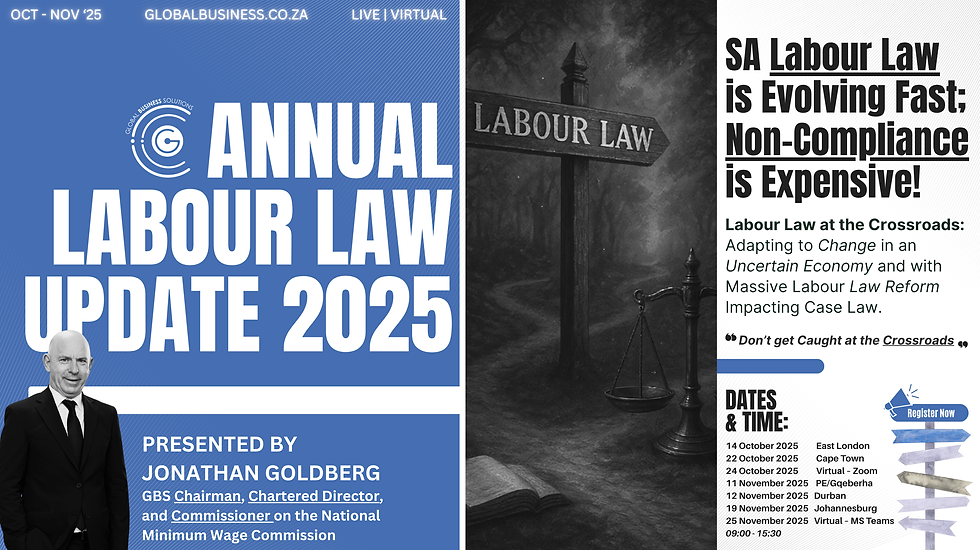Workplace Relationships
- John Botha

- Sep 17, 2025
- 3 min read

South African labour law does not specifically prohibit romantic or personal relationships at work, but judicial precedent and codes of conduct clarify when and how such relationships may be managed, especially if they threaten operational integrity, fairness, or staff wellbeing. Case law illustrates that an employee cannot be dismissed merely for having a relationship unless it genuinely disrupts the working environment or creates intolerable conditions. However, employers are justified in regulating workplace relationships through robust policy, especially where power dynamics, conflicts of interest, or risk of harassment exist.
Law and Privacy
The Constitution guarantees privacy and dignity to all, which extends into the workplace. The Labour Relations Act and Codes of Good Practice emphasise procedural and substantive fairness: dismissal or discipline must follow a fair procedure and be based on a fair reason. Employers may intervene when a relationship causes demonstrable harm—such as loss of trust, reputational damage, favouritism, or exposure to harassment claims.
Relevant Case Law
Zabala v Gold Reef City Casino 1 BLLR 94 (LC): Dismissals motivated solely by disapproval of personal relationships (like extra-marital affairs) were found to be automatically unfair unless the conduct fundamentally disrupted business operations or trust.
Humphries & Jewel (Pty) Ltd vs FEDCRAW (2006): The Labour Appeal Court reinforced that the employment relationship is rooted in trust and confidence. Discipline is only justified if misconduct makes continued employment intolerable—mere knowledge of a relationship is not enough.
Recent disciplinary actions: Cases involving non-disclosure of vertical relationships (where one partner has direct authority over the other) often result in disciplinary consequences, particularly if the relationship leads to actual or perceived bias, conflicts of interest, or breaches of governance and reporting obligations.
Should Employers Have a Workplace Relationship Policy?
A company should have a workplace relationship policy. Such a policy provides clarity, ensures fairness, and protects both the business and its employees from conflicts of interest, allegations of favouritism, or reputational harm. Policies foster a culture of respect, manage risk, and guarantee due process in the event of a workplace romance.
Key Principles for a Workplace Relationship Policy
Principle | Details |
Disclosure requirements | Employees in a romantic relationship, particularly across reporting lines (vertical relationships), must disclose the relationship to HR or management to allow for proper safeguards. |
Management of conflicts | Steps may be defined for dealing with perceived or actual conflicts of interest—such as adjusting reporting structures or removing one party from decision-making over the other’s career. |
Prohibition of favouritism | The policy must prevent favouritism, bias, or unfair treatment, especially where career progression, remuneration, or rewards could be influenced by the relationship. |
Confidentiality | Information relating to the relationship should be treated confidentially, except as necessary to manage risks. |
Conduct boundaries | The expected standard of professional behaviour at work, including what constitutes inappropriate displays of affection or harassment, must be clearly outlined. |
Harassment and abuse safeguards | The policy should address the difference between consensual relationships and potential abuse of power or sexual harassment, integrated into existing harassment policies. |
Termination or changes | Guidelines for changes when a relationship ends, including support mechanisms to maintain team productivity and harmony. |
Clear workplace relationship policies enable businesses to uphold fairness, protect employees’ dignity and privacy, and maintain trust, operational excellence, and legal compliance.
Join us at the Annual Labour Law Update. This year's theme is Labour Law at the Crossroads: Adapting to Change in an Uncertain Economy and with Massive Labour Law Reform Impacting Case Law. What you'll gain:
Master the Digital Transformation of Labour Law in 2025
200+ Labour Law Cases Unpacked by Jonathan Goldberg
Critical Updates on Upcoming Legislation & NEDLAC Amendments
Navigate Workplace Challenges from the Digital Era to Discrimination Laws

View our upcoming events: Upcoming Events, like Employment Equity Reporting, Social Media in the Workplace and another Pop-Up on the New Code of Good Practice on Dismissal.
*All workshops are offered as customised in-house training that can be presented virtually or on-site.
"Global Business Solutions (GBS)—Your Partner in Strategic HR Compliance"










Comments